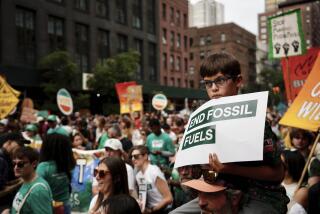Decades of Deals Keep ‘Mr. OPEC’ Thriving : At 79, N. Y. -Born Harry Neustein Still Involved in Trading Oil, Other Goods Throughout World
- Share via
NEW YORK — Sheik Ahmed Zaki Yamani, the former powerful oil minister of Saudi Arabia, calls him “Mr. OPEC.”
But Harry Neustein likes to call himself a “gypsy trader.”
A maverick oil trader for nearly 60 years, he remembers when crude oil cost about 70 cents for a 42-gallon barrel. (It’s now around $19 a barrel.)
Neustein hasn’t limited himself to oil: He’s an expert practitioner of international barter, having traded petrochemicals, plastics, jet aircraft, knitwear, tomatoes and assorted other goods around the world.
“The oil market’s changed,” Neustein said in a recent interview. “You’re in government-to-government deals, you’re in barter deals, you’re in payoff deals. There are discount deals, there are volume deals. This creates the volatility in the market. From a little barrel of oil I used to sell, I’m involved with things in Washington, Britain, Iran.”
International barter has assumed growing importance in recent years as many countries, especially in the Third World, have had their currency reserves depleted by falling commodity prices and increased debt payments to Western banks.
Many U.S. companies seeking to sell manufactured goods to these countries must be willing to accept the commodities they produce, rather than cash, as payment.
That’s where a veteran middleman like Neustein comes in, matching buyers with sellers and taking a commission on each successful transaction.
Impressive Credentials
Over the course of his career and numerous ups and downs in his fortunes, he has represented governments, corporations and banks in complex multinational barter deals, many of them involving oil. Along the way, he managed to build a petrochemical business from scratch and later sell it to W. R. Grace & Co., becoming for a time an international vice president of the New York-based conglomerate.
Neustein has been consulted on barter contracts by Boeing Co., Union Carbide Corp., International Business Machines Corp., Gulf Oil Corp. and several foreign governments. His international barter company, Watchpost Ltd., is based in London’s prestigious St. James’s Place.
Not bad for a guy who started out as a young hustler selling combs and hairpins from his mother’s pushcart on the Lower East Side of New York City, in true Horatio Alger style.
Today, the 79-year-old millionaire jets around the world, cobbling deals together and making a colorful appearance at most major meetings of the 13-nation Organization of Petroleum Exporting Countries.
Neustein is one of the best-known unofficial providers of information at the OPEC sessions--where the oil ministers, emerging from closed-door consultations, often utter only enigmatic statements to reporters and information becomes a precious, highly competitive commodity.
He has frequently advanced notions about OPEC and the oil market that seemed off-beat at the time but later were widely accepted.
“He certainly got the attention of some of the people in OPEC,” said Jim Tanner, a Wall Street Journal reporter and veteran of many OPEC sessions. “I think we ought to give him credit; he did stir things up.”
During OPEC’s fractious meeting in April 1986, in Geneva, Switzerland, Nigeria’s delegation authorized Neustein to help arrange sales of Nigerian crude to independent oil refiners in the United States.
One of his recent themes: that the OPEC producers, led by Saudi Arabia, can either have a stable share of the oil market or a stable price, but not both.
“No amount of cutting (oil) production is going to drive the price up in a market that is as competitive as it is today. The OPEC countries have to face competition from other producers,” Neustein said in his rapid-fire, staccato New York accent, jabbing the air with his index finger in a way that leaves little room for disagreement. (He pronounces the word “oil” something like “earl.”)
Doesn’t Pull Any Punches
Neustein talks about oil with an intensity most people reserve for sporting events, or maybe politics--and he doesn’t pull any punches.
He has pointedly reminded high-ranking Iranian oil officials that he worked with their grandfathers in Iran’s oil fields in 1935.
At OPEC’s historic London meeting in March, 1983, when the cartel cut its official oil price for the first time, Neustein publicly told Sheik Yamani: “Oil is becoming a rag trade again. The small traders are back in, where they belong. We are the new oil ministers.”
Saudi Arabia’s royal family ousted Yamani last October from the crucial post of oil minister, which he had held for more than 20 years. Neustein is convinced that the Saudis “sacrificed” Yamani to placate Iranian-style Moslem fundamentalists in the kingdom who considered Yamani overly accommodating to Western interests.
“The issue here isn’t oil,” Neustein said. “It isn’t even politics; it’s religion. The Saudis are under pressure from the Islamic purists in their own country.”
He recently sent a telexed message to King Fahd, the Saudi ruler, telling him: “I urge that you bring back Yamani . . . you cannot let politics dictate your sovereign rights.”
Last September, while he was still oil minister, Yamani addressed a conference at Harvard University attended by such luminaries as former Secretary of State Henry Kissinger, Defense Secretary Casper Weinberger and Washington Post Publisher Katharine Graham. When the organizers tried to keep Neustein out of Yamani’s audience because he didn’t have the proper invitation, the Saudi vouched for Neustein, declaring, “This is Mr. OPEC.”
Asked why he runs around the world, going to OPEC meetings and hunting new barter deals at an age when most people are enjoying retirement, Neustein replied: “I like to feel needed.”
More to Read
Inside the business of entertainment
The Wide Shot brings you news, analysis and insights on everything from streaming wars to production — and what it all means for the future.
You may occasionally receive promotional content from the Los Angeles Times.










